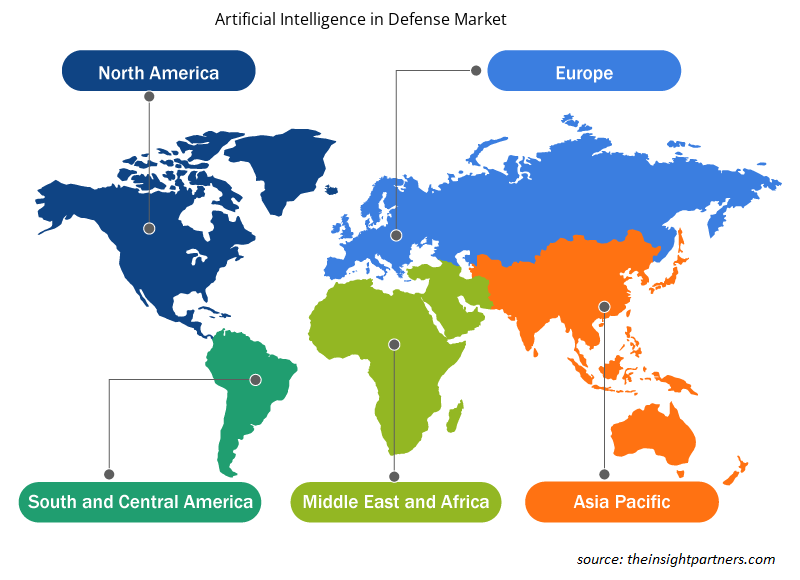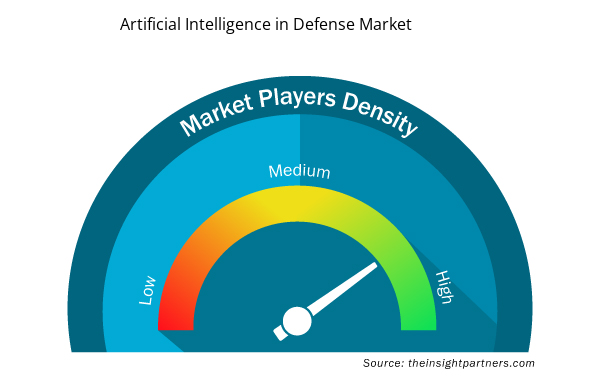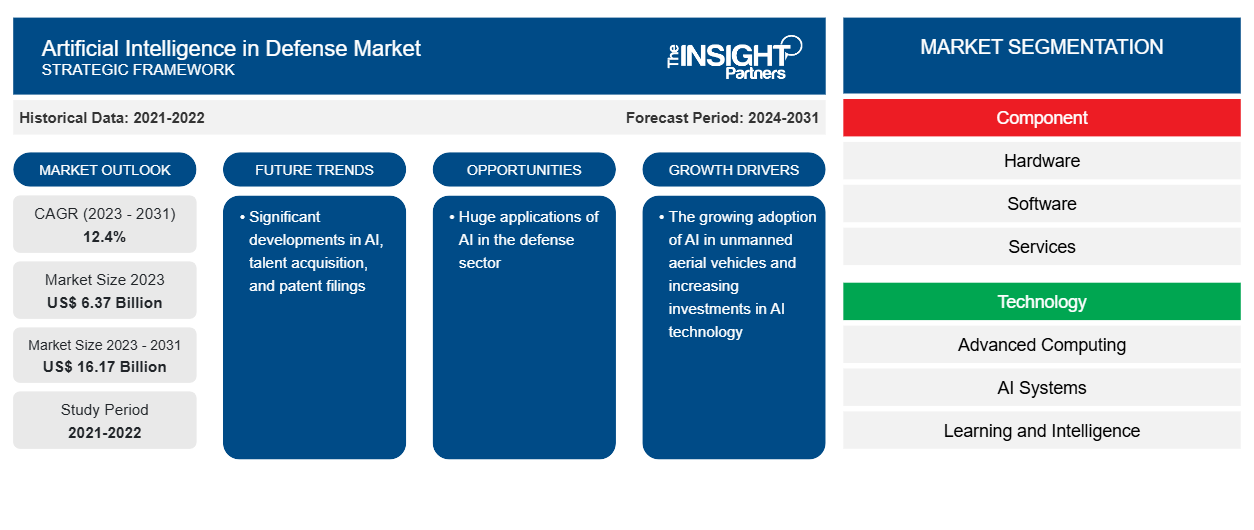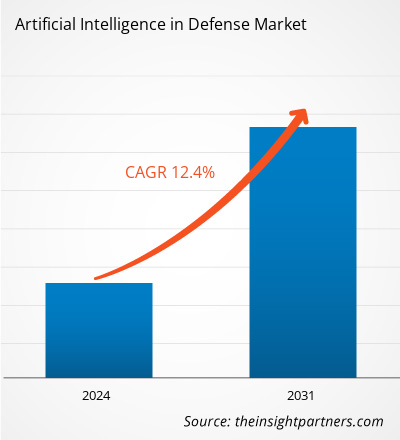من المتوقع أن يصل حجم سوق الذكاء الاصطناعي في الدفاع إلى 16.17 مليار دولار أمريكي بحلول عام 2031 من 6.37 مليار دولار أمريكي في عام 2023. ومن المتوقع أن يسجل السوق معدل نمو سنوي مركب بنسبة 12.4٪ خلال الفترة 2023-2031. ومن المرجح أن تظل التطورات المهمة في الذكاء الاصطناعي واستقطاب المواهب وتقديم براءات الاختراع اتجاهًا رئيسيًا في السوق.
تحليل سوق الذكاء الاصطناعي في الدفاع
على مدى السنوات القليلة الماضية، شهد الذكاء الاصطناعي في سوق الدفاع نموًا هائلاً بسبب عوامل مثل التبني المتزايد للذكاء الاصطناعي في المركبات الجوية غير المأهولة وزيادة الاستثمارات في تكنولوجيا الذكاء الاصطناعي. توفر التطبيقات الضخمة للذكاء الاصطناعي في قطاع الدفاع فرص نمو مربحة للذكاء الاصطناعي في سوق الدفاع.
نظرة عامة على سوق الذكاء الاصطناعي في الدفاع
يشير الذكاء الاصطناعي في الدفاع إلى دمج التقنيات المتقدمة مع معدات الدفاع لزيادة كفاءتها وتطبيقاتها. في العديد من البلدان المتقدمة، يتلقى قطاع الدفاع استثمارات من الحكومة. على سبيل المثال، وفقًا لمعهد ستوكهولم الدولي لأبحاث السلام، ارتفع الإنفاق العسكري الأمريكي إلى 876.9 مليار دولار أمريكي في عام 2022 من 806.2 مليار دولار أمريكي في عام 2021. تُستخدم هذه الاستثمارات في البحث والتطوير لتقنيات جديدة وتطوير معدات متقدمة يمكن استخدامها أثناء المعارك أو الحروب. الذكاء الاصطناعي المجهز بأنظمة دفاعية قادر على التعامل مع كميات كبيرة من البيانات بكفاءة. بالإضافة إلى ذلك، تحسنت هذه الأنظمة من التنظيم الذاتي والتحكم الذاتي بسبب قدراتها المحسنة على الحوسبة واتخاذ القرار. علاوة على ذلك، تستخدم منصات الأسلحة المستقلة تقنية الرؤية الحاسوبية لتحديد وتتبع الأشياء. يمكن أن يساعد الذكاء الاصطناعي في استخراج المعلومات المفيدة من المعدات، بما في ذلك الرادارات وأنظمة التعريف التلقائي. لذلك، فإن ترقية الأسلحة والأدوات والمعدات الدفاعية بأحدث التقنيات يدفع نمو سوق الذكاء الاصطناعي في الدفاع.
قم بتخصيص هذا التقرير ليناسب متطلباتك
ستحصل على تخصيص لأي تقرير - مجانًا - بما في ذلك أجزاء من هذا التقرير، أو تحليل على مستوى الدولة، وحزمة بيانات Excel، بالإضافة إلى الاستفادة من العروض والخصومات الرائعة للشركات الناشئة والجامعات
- احصل على أهم اتجاهات السوق الرئيسية لهذا التقرير.ستتضمن هذه العينة المجانية تحليلاً للبيانات، بدءًا من اتجاهات السوق وحتى التقديرات والتوقعات.
الذكاء الاصطناعي في سوق الدفاع: العوامل المحفزة والفرص
تزايد استخدام الذكاء الاصطناعي في المركبات الجوية غير المأهولة لصالح السوق
لقد خضعت المركبات الجوية بدون طيار لتحول ثوري مع اعتماد الذكاء الاصطناعي. تسمح المركبات الجوية بدون طيار المدمجة بالذكاء الاصطناعي لها بمعالجة كميات هائلة من البيانات في الوقت الفعلي واتخاذ القرارات والتكيف مع البيئات المتغيرة دون تدخل مباشر من المشغل البشري. تم تجهيز المركبات الجوية بدون طيار التي تعمل بالذكاء الاصطناعي بأجهزة استشعار وقدرات رؤية كمبيوترية لاكتشاف الأشياء والملاحة المستقلة. لقد فتح الذكاء الاصطناعي في المركبات الجوية بدون طيار آفاقًا جديدة في تطبيقات مثل المراقبة ومهام البحث والإنقاذ والعمليات الدفاعية. وبالتالي، فإن التبني المتزايد للذكاء الاصطناعي في المركبات الجوية بدون طيار من شأنه أن يدفع نمو السوق.
تطبيقات ضخمة للذكاء الاصطناعي في قطاع الدفاع
يعمل الذكاء الاصطناعي على تحويل صناعة الدفاع من خلال دفع الابتكارات في السلامة والكفاءة واتخاذ القرار. تُستخدم التكنولوجيا القائمة على الذكاء الاصطناعي في قطاع الدفاع على نطاق واسع في العديد من التطبيقات مثل التدريب والخدمات اللوجستية والمراقبة والطائرات بدون طيار والأمن السيبراني والأسلحة العسكرية المتقدمة مثل الأسلحة الآلية ذاتية التشغيل والمركبات القتالية المستقلة والروبوتات. وبالتالي، تستفيد شركات الدفاع بشكل متزايد من تكنولوجيا الذكاء الاصطناعي للابتكار وتحسين عملياتها.
تقرير تحليل تجزئة سوق الذكاء الاصطناعي في الدفاع
إن القطاعات الرئيسية التي ساهمت في اشتقاق تحليل سوق الذكاء الاصطناعي في الدفاع هي المكونات والتكنولوجيا والمنصات والتطبيقات.
- بناءً على المكون، ينقسم الذكاء الاصطناعي في سوق الدفاع إلى أجهزة وبرامج وخدمات. ومن المتوقع أن يحظى قطاع البرامج بحصة سوقية كبيرة في عام 2023.
- من حيث التكنولوجيا، يتم تقسيم السوق إلى الحوسبة المتقدمة وأنظمة الذكاء الاصطناعي والتعلم والذكاء. كما يتم تقسيم قطاع أنظمة الذكاء الاصطناعي إلى TETRA وDMR وP25 وغيرها. ومن المتوقع أن يستحوذ القطاع الرقمي على حصة سوقية كبيرة في عام 2023.
- من حيث المنصة، يتم تقسيم السوق إلى برية وجوية وبحرية. ومن المتوقع أن يستحوذ القطاع الجوي على حصة سوقية كبيرة في عام 2023.
- من حيث التطبيق، يتم تقسيم السوق إلى الأمن السيبراني، والرعاية الصحية في ساحة المعركة، والخدمات اللوجستية والنقل، ومنصات الحرب، وغيرها. ومن المتوقع أن يستحوذ قطاع منصات الحرب على حصة سوقية كبيرة في عام 2023.
تحليل حصة سوق الذكاء الاصطناعي في الدفاع حسب المنطقة الجغرافية
ينقسم النطاق الجغرافي لتقرير سوق الذكاء الاصطناعي في الدفاع بشكل أساسي إلى خمس مناطق: أمريكا الشمالية، وآسيا والمحيط الهادئ، وأوروبا، والشرق الأوسط وأفريقيا، وأمريكا الجنوبية والوسطى.
ينقسم سوق الذكاء الاصطناعي في الدفاع في أمريكا الشمالية إلى الولايات المتحدة وكندا والمكسيك. تقدم التطورات الجارية في الذكاء الاصطناعي آفاقًا مثيرة وعقبات جديدة لوكالات الأمن القومي. كان الذكاء الاصطناعي، الذي يتزامن غالبًا مع الثورة الصناعية الرابعة، يقود الابتكارات العلمية والتقنية في أمريكا الشمالية. تعتقد السلطات العسكرية في الولايات المتحدة وكندا أن التكنولوجيا لديها القدرة على تغيير الطريقة التي يتم بها تنفيذ العمليات العسكرية بشكل كبير. على سبيل المثال، كانت وكالة مشاريع الأبحاث الدفاعية المتقدمة التابعة للبنتاجون (DARPA) تستكشف الذكاء الاصطناعي (AI) لإدارة الطائرات بدون طيار التي تحمل أسلحة ومعدات عسكرية لمواجهة الأعداء، حيث تحتاج مهام الطائرات بدون طيار في الولايات المتحدة التي تنطوي على قوة مميتة إلى مراقبة وإشراف بشريين.
الذكاء الاصطناعي في سوق الدفاع: رؤى إقليمية
لقد قام المحللون في Insight Partners بشرح الاتجاهات والعوامل الإقليمية المؤثرة على سوق الذكاء الاصطناعي في الدفاع طوال فترة التوقعات بشكل شامل. يناقش هذا القسم أيضًا قطاعات سوق الذكاء الاصطناعي في الدفاع والجغرافيا في جميع أنحاء أمريكا الشمالية وأوروبا ومنطقة آسيا والمحيط الهادئ والشرق الأوسط وأفريقيا وأمريكا الجنوبية والوسطى.

- احصل على البيانات الإقليمية المحددة للذكاء الاصطناعي في سوق الدفاع
نطاق تقرير سوق الذكاء الاصطناعي في الدفاع
| سمة التقرير | تفاصيل |
|---|---|
| حجم السوق في عام 2023 | 6.37 مليار دولار أمريكي |
| حجم السوق بحلول عام 2031 | 16.17 مليار دولار أمريكي |
| معدل النمو السنوي المركب العالمي (2023 - 2031) | 12.4% |
| البيانات التاريخية | 2021-2022 |
| فترة التنبؤ | 2024-2031 |
| القطاعات المغطاة | حسب المكون
|
| المناطق والدول المغطاة | أمريكا الشمالية
|
| قادة السوق وملفات تعريف الشركات الرئيسية |
|
كثافة اللاعبين في سوق الذكاء الاصطناعي في الدفاع: فهم تأثيره على ديناميكيات الأعمال
يشهد سوق الذكاء الاصطناعي في الدفاع نموًا سريعًا، مدفوعًا بالطلب المتزايد من المستخدم النهائي بسبب عوامل مثل تفضيلات المستهلكين المتطورة والتقدم التكنولوجي والوعي المتزايد بفوائد المنتج. ومع ارتفاع الطلب، تعمل الشركات على توسيع عروضها والابتكار لتلبية احتياجات المستهلكين والاستفادة من الاتجاهات الناشئة، مما يؤدي إلى زيادة نمو السوق.
تشير كثافة اللاعبين في السوق إلى توزيع الشركات أو المؤسسات العاملة في سوق أو صناعة معينة. وهي تشير إلى عدد المنافسين (اللاعبين في السوق) الموجودين في مساحة سوق معينة نسبة إلى حجمها أو قيمتها السوقية الإجمالية.
الشركات الرئيسية العاملة في سوق الذكاء الاصطناعي في الدفاع هي:
- شركة بي أيه إي سيستمز المحدودة.
- شركة آي بي إم
- لييدوس
- شركة لوكهيد مارتن
- شركة رايثيون تكنولوجيز
- شركة تشارلز ريفر للتحليلات
إخلاء المسؤولية : الشركات المذكورة أعلاه ليست مرتبة بأي ترتيب معين.

- احصل على نظرة عامة على أهم اللاعبين الرئيسيين في سوق الذكاء الاصطناعي في الدفاع
الذكاء الاصطناعي في سوق الدفاع – أخبار وتطورات حديثة
يتم تقييم الذكاء الاصطناعي في سوق الدفاع من خلال جمع البيانات النوعية والكمية بعد البحث الأولي والثانوي، والتي تتضمن منشورات الشركات المهمة وبيانات الجمعيات وقواعد البيانات. فيما يلي بعض التطورات في الذكاء الاصطناعي في سوق الدفاع:
- وقعت شركة إيرباص للدفاع والفضاء وشركة هيلسينج، الشركة الرائدة في أوروبا في مجال الذكاء الاصطناعي والبرمجيات الدفاعية، اتفاقية إطارية للتعاون في معرض الطيران والفضاء الدولي في برلين. ووفقًا للاتفاقية، ستعمل الشركتان معًا على تقنيات الذكاء الاصطناعي التي سيتم استخدامها في نظام Wingman المستقبلي. (المصدر: إيرباص للدفاع، بيان صحفي، يونيو 2024)
- أقامت شركة Lockheed Martin Skunk Works شراكة مع مختبر أداء المشغلين (OPL) التابع لجامعة أيوا لإثبات استخدام الذكاء الاصطناعي (AI) في سيناريوهات اعتراض الطائرات من الجو إلى الجو. (المصدر: Lockheed Martin، بيان صحفي، يونيو 2024)
تقرير سوق الذكاء الاصطناعي في الدفاع: التغطية والنتائج المتوقعة
يوفر تقرير "حجم سوق الذكاء الاصطناعي في الدفاع والتوقعات (2021-2031)" تحليلاً مفصلاً للسوق يغطي المجالات التالية:
- حجم سوق الذكاء الاصطناعي في الدفاع وتوقعاته على المستويات العالمية والإقليمية والوطنية لجميع قطاعات السوق الرئيسية التي يغطيها النطاق
- اتجاهات سوق الذكاء الاصطناعي في الدفاع، بالإضافة إلى ديناميكيات السوق مثل المحركات والقيود والفرص الرئيسية
- تحليل مفصل لقوى PEST/Porter الخمس وSWOT
- تحليل سوق الذكاء الاصطناعي في الدفاع يغطي اتجاهات السوق الرئيسية والإطار العالمي والإقليمي والجهات الفاعلة الرئيسية واللوائح والتطورات الأخيرة في السوق
- تحليل المشهد الصناعي والمنافسة الذي يغطي تركيز السوق، وتحليل خريطة الحرارة، واللاعبين البارزين، والتطورات الأخيرة للذكاء الاصطناعي في سوق الدفاع
- ملفات تعريف الشركة التفصيلية
- التحليل التاريخي (سنتان)، السنة الأساسية، التوقعات (7 سنوات) مع معدل النمو السنوي المركب
- تحليل PEST و SWOT
- حجم السوق والقيمة / الحجم - عالميًا وإقليميًا وقطريًا
- الصناعة والمنافسة
- مجموعة بيانات Excel



Report Coverage
Revenue forecast, Company Analysis, Industry landscape, Growth factors, and Trends

Segment Covered
This text is related
to segments covered.

Regional Scope
North America, Europe, Asia Pacific, Middle East & Africa, South & Central America

Country Scope
This text is related
to country scope.
الأسئلة الشائعة
The artificial intelligence in defense market size is projected to reach US$ 16.17 billion by 2031.
North America is expected to dominate artificial intelligence in the defense market with the highest market share in 2023.
The leading players operating in the artificial intelligence in defense market are BAE Systems plc.; IBM Corporation; Leidos; Lockheed Martin Corporation; Raytheon Technologies Corporation; Charles River Analytics, Inc.; General Dynamics Information Technology, Inc. (General Dynamics Corporation); Shield AI; SparkCognition, Inc.; and Thales Group
Significant developments in AI, talent acquisition, and patent filings are anticipated to play a significant role in the global artificial intelligence in defense market in the coming years.
The growing adoption of AI in unmanned aerial vehicles and increasing investments in AI technology are the major factors driving artificial intelligence in the defense market.
The global artificial intelligence in defense market is expected to grow at a CAGR of 12.4% during the forecast period 2024 - 2031.
Trends and growth analysis reports related to Technology, Media and Telecommunications : READ MORE..
The Insight Partners performs research in 4 major stages: Data Collection & Secondary Research, Primary Research, Data Analysis and Data Triangulation & Final Review.
- Data Collection and Secondary Research:
As a market research and consulting firm operating from a decade, we have published and advised several client across the globe. First step for any study will start with an assessment of currently available data and insights from existing reports. Further, historical and current market information is collected from Investor Presentations, Annual Reports, SEC Filings, etc., and other information related to company’s performance and market positioning are gathered from Paid Databases (Factiva, Hoovers, and Reuters) and various other publications available in public domain.
Several associations trade associates, technical forums, institutes, societies and organization are accessed to gain technical as well as market related insights through their publications such as research papers, blogs and press releases related to the studies are referred to get cues about the market. Further, white papers, journals, magazines, and other news articles published in last 3 years are scrutinized and analyzed to understand the current market trends.
- Primary Research:
The primarily interview analysis comprise of data obtained from industry participants interview and answers to survey questions gathered by in-house primary team.
For primary research, interviews are conducted with industry experts/CEOs/Marketing Managers/VPs/Subject Matter Experts from both demand and supply side to get a 360-degree view of the market. The primary team conducts several interviews based on the complexity of the markets to understand the various market trends and dynamics which makes research more credible and precise.
A typical research interview fulfils the following functions:
- Provides first-hand information on the market size, market trends, growth trends, competitive landscape, and outlook
- Validates and strengthens in-house secondary research findings
- Develops the analysis team’s expertise and market understanding
Primary research involves email interactions and telephone interviews for each market, category, segment, and sub-segment across geographies. The participants who typically take part in such a process include, but are not limited to:
- Industry participants: VPs, business development managers, market intelligence managers and national sales managers
- Outside experts: Valuation experts, research analysts and key opinion leaders specializing in the electronics and semiconductor industry.
Below is the breakup of our primary respondents by company, designation, and region:

Once we receive the confirmation from primary research sources or primary respondents, we finalize the base year market estimation and forecast the data as per the macroeconomic and microeconomic factors assessed during data collection.
- Data Analysis:
Once data is validated through both secondary as well as primary respondents, we finalize the market estimations by hypothesis formulation and factor analysis at regional and country level.
- Macro-Economic Factor Analysis:
We analyse macroeconomic indicators such the gross domestic product (GDP), increase in the demand for goods and services across industries, technological advancement, regional economic growth, governmental policies, the influence of COVID-19, PEST analysis, and other aspects. This analysis aids in setting benchmarks for various nations/regions and approximating market splits. Additionally, the general trend of the aforementioned components aid in determining the market's development possibilities.
- Country Level Data:
Various factors that are especially aligned to the country are taken into account to determine the market size for a certain area and country, including the presence of vendors, such as headquarters and offices, the country's GDP, demand patterns, and industry growth. To comprehend the market dynamics for the nation, a number of growth variables, inhibitors, application areas, and current market trends are researched. The aforementioned elements aid in determining the country's overall market's growth potential.
- Company Profile:
The “Table of Contents” is formulated by listing and analyzing more than 25 - 30 companies operating in the market ecosystem across geographies. However, we profile only 10 companies as a standard practice in our syndicate reports. These 10 companies comprise leading, emerging, and regional players. Nonetheless, our analysis is not restricted to the 10 listed companies, we also analyze other companies present in the market to develop a holistic view and understand the prevailing trends. The “Company Profiles” section in the report covers key facts, business description, products & services, financial information, SWOT analysis, and key developments. The financial information presented is extracted from the annual reports and official documents of the publicly listed companies. Upon collecting the information for the sections of respective companies, we verify them via various primary sources and then compile the data in respective company profiles. The company level information helps us in deriving the base number as well as in forecasting the market size.
- Developing Base Number:
Aggregation of sales statistics (2020-2022) and macro-economic factor, and other secondary and primary research insights are utilized to arrive at base number and related market shares for 2022. The data gaps are identified in this step and relevant market data is analyzed, collected from paid primary interviews or databases. On finalizing the base year market size, forecasts are developed on the basis of macro-economic, industry and market growth factors and company level analysis.
- Data Triangulation and Final Review:
The market findings and base year market size calculations are validated from supply as well as demand side. Demand side validations are based on macro-economic factor analysis and benchmarks for respective regions and countries. In case of supply side validations, revenues of major companies are estimated (in case not available) based on industry benchmark, approximate number of employees, product portfolio, and primary interviews revenues are gathered. Further revenue from target product/service segment is assessed to avoid overshooting of market statistics. In case of heavy deviations between supply and demand side values, all thes steps are repeated to achieve synchronization.
We follow an iterative model, wherein we share our research findings with Subject Matter Experts (SME’s) and Key Opinion Leaders (KOLs) until consensus view of the market is not formulated – this model negates any drastic deviation in the opinions of experts. Only validated and universally acceptable research findings are quoted in our reports.
We have important check points that we use to validate our research findings – which we call – data triangulation, where we validate the information, we generate from secondary sources with primary interviews and then we re-validate with our internal data bases and Subject matter experts. This comprehensive model enables us to deliver high quality, reliable data in shortest possible time.


 احصل على عينة مجانية لهذا التقرير
احصل على عينة مجانية لهذا التقرير